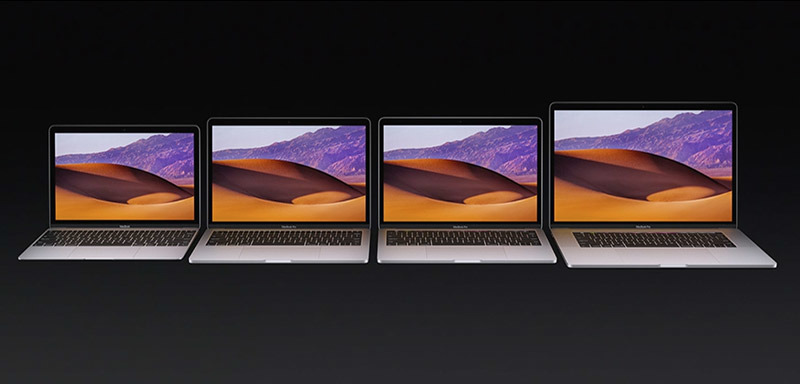Overshadowed by new hardware "sneak peeks" and software news, Apple on Monday updated its MacBook and MacBook Pro lineups with Intel Kaby Lake processors, while giving the MacBook Air a minor speed boost.
With today's refresh, all MacBook models, from the 13-inch MacBook Air to the 15-inch MacBook Pro with Touch Bar, receive processor upgrades to keep their performance in line with the competition.
Starting at the top, Apple is giving the 15-inch MacBook Pro with Touch Bar the Intel Kaby Lake treatment. The high-end laptop is now available with seventh-generation Core i7 processors that range from 2.8GHz quad-core to 3.1GHz quad-core variants.
Kaby Lake operates on the same core as sixth-gen Skylake processors, but is built on a 14 nanometer process and is able to achieve higher clock rates. The CPU family also features onboard support for HEVC encoding and decoding, an important consideration with Apple moving from H.264 to H.265 in macOS 10.13 High Sierra.
Apple is also making a change to its flagship notebook's graphics capabilities, and is offering AMD's Radeon Pro 555 discrete GPU with 2GB of memory as a standard option. The more powerful Radeon Pro 560 with 4GB of RAM is available as an add-on.
Apple's 13-inch MacBook Pro with Touch Bar also gets Kaby Lake chips with dual core i5 options clocked at 3.1GHz and 3.3GHz. The series maxes out with a 3.5GHz dual core i7 chip with Turbo Boost up to 4.0GHz. Graphics duties are handled by an integrated Intel Iris Plus Graphics 650 chip.
Sitting below the 13-inch MacBook Pro with Touch Bar are two function key configurations that come kitted with 2.3GHz dual-core Intel Core i5 processors and Intel Iris Plus Graphics 640 components. A 2.5GHz dual-core Core i7 CPU is available as an option.
To help boost adoption, Apple is offering a low-end configuration of the 13-inch MacBook Pro with function keys for $1,299. This particular model swaps out the usual 256GB SSD for a 128GB module, shaving $200 off the asking price.
The 12-inch MacBook also sees processor upgrades starting with a 1.2GHz dual-core Intel Core m3 CPU, while a higher tier version is configurable up to a 1.4GHz dual-core Intel Core i7 processor. In addition to the speed boosts, Apple said the ultraportable now benefits from speedy SSDs that are 50 percent faster than predecessor models.
Finally, the long-in-the-tooth 13-inch MacBook Air receives a faster 1.8GHz dual-core Intel Core i5 processor, which can be upgraded to a 2.2GHz dual-core Intel Core i7 chip.
All in all, Apple's MacBook updates are minor at best, keeping the laptop family within striking distance of comparable Windows notebooks. For now, it seems Apple is content to maintain the status quo as it readies a major revamp speculated to arrive in 2018.
Over the weekend, an alleged "Foxconn insider" dumped a mountain of information regarding supposed future Apple products, MacBook among them. The anonymous source claims future MacBooks, presumably Pro models, will feature keys with built-in e-ink displays, extending the idea of a configurable Touch Bar down into the keyboard. Apple is also purportedly working to increase the amount of onboard RAM to 32GB, double what is currently offered on the 15-inch MacBook Pro with Touch Bar.
As previously noted by AppleInsider, the e-ink keyboard reportedly up for inclusion in future MacBooks is actually technology developed by a firm tied to Foxconn's accelerator program. That company, Sonder, confirmed the e-ink device is a standalone product that, as of October, was not being considered for inclusion in an Apple product.
That being said, Apple does hold a number of patents relating to configurable laptop and desktop keyboards. A future MacBook could incorporate e-ink, or more likely LCD, technology to achieve results demonstrated with other devices like Art Lebedev's Optimus keyboard, but a 2018 release seems overly optimistic.
In the near term, Apple is more likely to launch a minor design revamp and concentrate on internal component improvements. For example, reports in February claimed the company is developing an ARM chip that can handle low-power functions offloaded from the main CPU, facilitating energy-efficient features like Power Nap.
 Mikey Campbell
Mikey Campbell







-m.jpg)






 Charles Martin
Charles Martin
 Christine McKee
Christine McKee
 Wesley Hilliard
Wesley Hilliard
 Malcolm Owen
Malcolm Owen
 Andrew Orr
Andrew Orr
 William Gallagher
William Gallagher
 Sponsored Content
Sponsored Content







40 Comments
The i7 chip for 3.1 gHz call i7-7920HQ, which supports 64GB Ram.
Still this MBP only supports 16G RAM.
Maybe I just wait a little longer.
These e-ink keyboard thingies: they are still mechanical keys that move, right? Not like an iPad/iPhone keyboard?
Mac laptops are the only thing I felt disappointed in yesterday's WWDC. Hopefully next year we will get something like hex-core Xeon with ECC capabilities.
Although Coffee Lake still won't support LPDDR4 and that sucks...